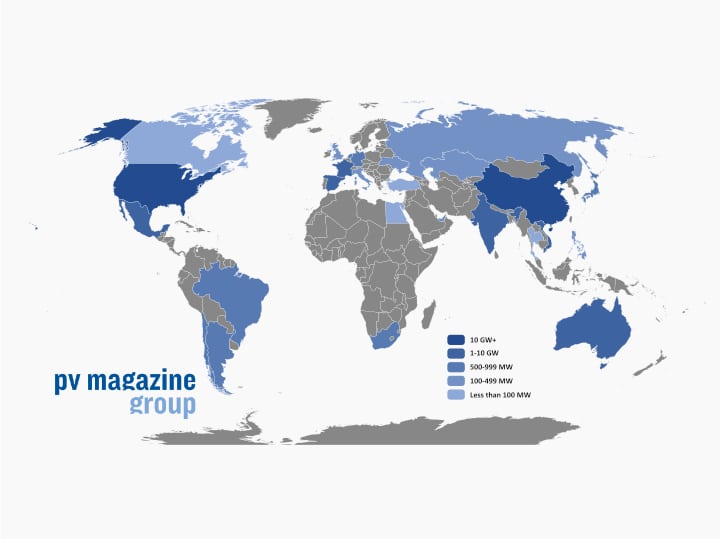The 50 GWac of large scale solar project generation capacity added last year marked a record annual return for solar, according to the latest figures gathered by U.K.-based analyst Wiki-Solar.
Equating to 65 GWp of new capacity, the volume added–in terms of officially reported projects–takes the world to 270 GWac of solar capacity, according to the latest annual return.
With Wiki-Solar ranking the top 26 nations by the amount of large scale projects added in 2020 and by cumulative generation capacity, China continued to lead the world, and the lack of public reporting of some projects in the world solar capital ensures the analyst can be prone to underestimate Chinese additions.
The U.S. almost overtook its solar superpower rival–at least in Wiki-Solar terms–with 242 announced large scale projects amounting to 12 GWac of capacity, compared to the 97 projects for 12.8 GWac added, officially, in China.
Spain soared back up the ranking with 52 projects adding 3.9 GWac of capacity, including unsubsidized facilities such as ACS Group's Escatrón-Chiprana-Samper, which has a 730 MWac footprint and electric utility Iberdrola's 500 MWac Núñez de Balboa.
Wiki-Solar noted the 29 large projects installed in Australia, for 3.6 GWac of new capacity, indicate grid connection bottlenecks are “gradually” easing and pointed out the arrival of projects subsidized under the SDE+ program helped the Netherlands double its solar capacity, to 1.8 GWac.
It was a different story in the U.K., where just 11 new large scale projects were connected, for 162 MWac of generation capacity last year. Italy and Canada also tumbled down the rankings.
Wiki-Solar is predicting another record this year, provided world number three India can complete all its planned solar tenders and the U.S. can deliver on what promises to be another bumper 12 months. With more than 9.8 GWac of cumulative solar capacity, following the golden years of 2009-12, Spain is likely to join the 10 GWac club in 2021, added the analyst.
This content is protected by copyright and may not be reused. If you want to cooperate with us and would like to reuse some of our content, please contact: editors@pv-magazine.com.




By submitting this form you agree to pv magazine using your data for the purposes of publishing your comment.
Your personal data will only be disclosed or otherwise transmitted to third parties for the purposes of spam filtering or if this is necessary for technical maintenance of the website. Any other transfer to third parties will not take place unless this is justified on the basis of applicable data protection regulations or if pv magazine is legally obliged to do so.
You may revoke this consent at any time with effect for the future, in which case your personal data will be deleted immediately. Otherwise, your data will be deleted if pv magazine has processed your request or the purpose of data storage is fulfilled.
Further information on data privacy can be found in our Data Protection Policy.